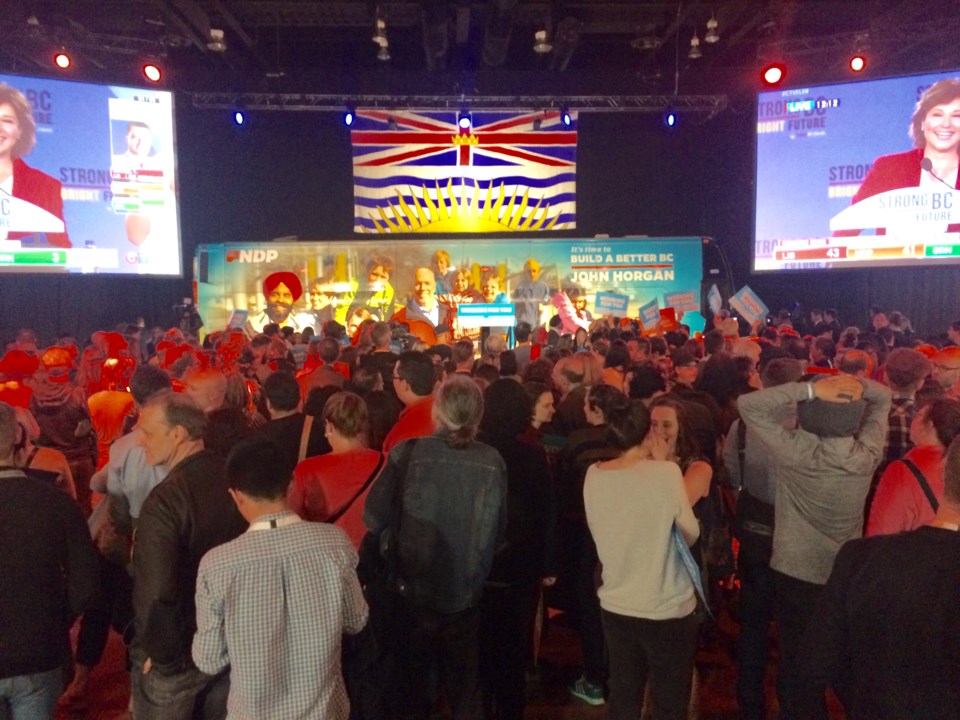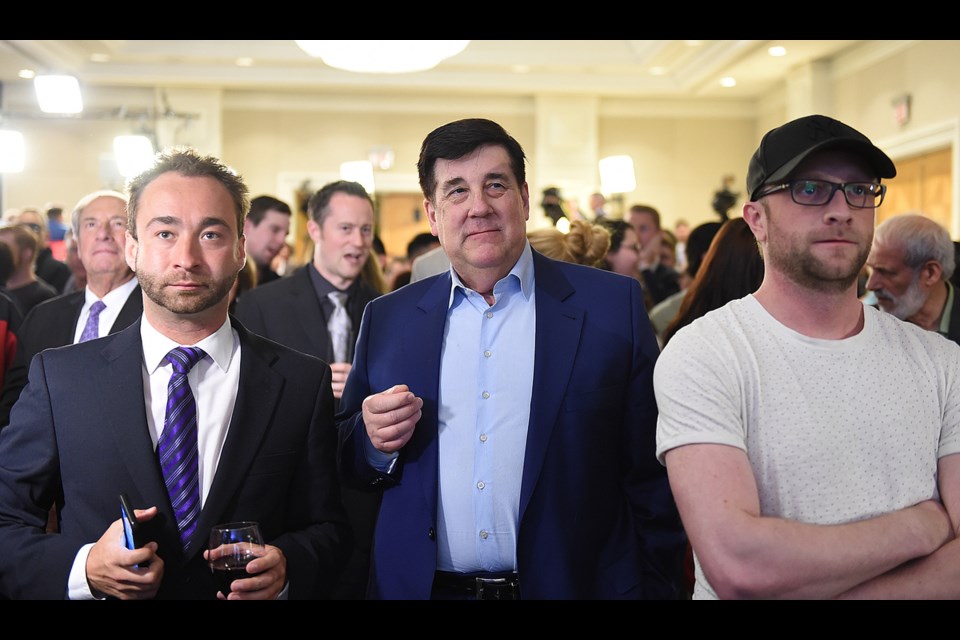Premier Christy Clark is still Premier of British Columbia – for now – but unless a recount in close ridings like Courtney-Comox or absentee ballots hand the BC Liberals a majority, Green Party Leader Andrew Weaver is now the most influential political in B.C.
A vertigo-inducing election night produced what looks to be a minority government for the Liberals, although that could change.
As it stands now, the Liberals won 43 seats in the Legislature – one short of the 44 needed for a majority – while the NDP took 41. The Green Party won three seats, but is now poised to have disproportionate sway.
The NDP claimed the Courtney-Comox riding by just nine votes, which will mean a recount. There are also absentee ballots yet to count, so the actual mix in the Legislature will not be known for a couple of weeks.
Barring any major change in the current makeup of seats, Weaver could agree to form a coalition with either the NDP or Liberals to give them a majority. Or he could simply allow the Liberals to govern as a minority government, in which case the Green vote will become crucial to passing key policies.
B.C. could again have the highest and fastest-rising carbon taxes in North America, if Weaver has anything to say about it, and suddenly he may have a whole lot to say about it.
Weaver made it clear on election night that electoral reform is his starting bid. He wants to see proportional representation and campaign financing reform.
“I would expect that as soon as government sits in the Legislature, there will be very soon after that legislation tabling banning big money in B.C.,” he said. “That’s a condition that we made as part of our agreement moving forward.”

Campaign financing and electoral reform is one policy that aligns with NDP policy.
“British Columbians voted today to get big money out of politics,” NDP Leader John Horgan told jubilant supporters Tuesday night. “British Columbians voted today for proportional representation.”
Horgan did not take questions from reporters, however, so the one question on everyone’s minds went unanswered: Could he work with the Green Party to form a coalition that would deny the Liberals governing power?
Weaver has proven himself to be a pragmatist who has supported Liberal budgets – something Horgan criticized him over.
But Weaver’s platform contains certain key planks that align more with the NDP than the Liberals – universal child care, for example, aggressive measures on housing affordability, higher carbon tax increases and support for public transit funding that doesn’t include the replacement of the George Massey Tunnel with a bridge.
“BC Greens have said we can work with anyone,” Weaver said. “We will continue to have discussions, and we know how to compromise.”
The ever-upbeat Clark tried to spin the May 9 election results in a positive light, despite the fact her party ended up the biggest loser, with a number of Liberal cabinet ministers losing their seats to the NDP.
“We have been presented with an opportunity by British Columbians to open a whole new dialogue in our province, in our Legislature,” Clark said. “So tonight is the beginning of something very different, and something which I think could be really exciting for the future of our province and for our kids.”
But Clark’s single most important priority – developing a liquefied natural gas industry – is a non-starter for Weaver, a former climate change scientist who has fought against LNG.
“LNG is not happening,” he said on election night. “I’ve been saying this for four years now. British Columbians were sold a good on LNG. It wasn’t going to happen then, it’s not going to happen now. LNG’s not happening so let’s move on to the new economy.”
Weaver also does not want to see the Trans Mountain pipeline expansion.
That project has already been approved by both the provincial and federal governments, however. It’s just not clear whether Kinder Morgan’s shareholders and partners will now make a final investment decision on the $7.4 billion, given the uncertainties that a minority government pose.
Greg D’Avignon, CEO of the Business Council of British Columbia, doesn’t think a minority government with the Greens holding sway will necessarily stop major energy projects like the Trans Mountain pipeline expansion or the $36 billion Pacific NorthWest LNG project from going forward.
But he does think a minority government would be generally bad for business, bad for the economy and bad for investment because of the uncertainty it creates.
“There’s going to be uncertainty for the next few weeks, but there’s going to be uncertainty past that,” he said. “We’ll get decisions but they will take longer, they will often be more complicated because there will be layered issues in those compromises.
“Uncertainty is not just a risk for business, it’s a risk for the economy as a whole because there’s lots of places to invest money and grow your business. And in an uncertain world, where you might have policy swings as a result of compromise and horse trading, it really makes it complicated.”
D’Avignon does not think the new makeup in the Legislature will necessarily halt projects like the Trans Mountain pipeline expansion of PNW LNG projects from going forward because they are already approved, federally and provincially.
“Will it take a little longer to get some things done? Yes. But those projects have already been approved, they’ve already gone through court cases. The decision to go ahead has already been made.”
But Iain Black, CEO for the Greater Vancouver Board of Trade, said it’s not any provincial government policy that could halt or delay projects like Trans Mountain, but shareholder jitters.
“The pipeline in particular, that puts that whole project in a precarious position,” he said. “Not that the province has any powers to actually stop it, let’s remember. This is a federal project. But nonetheless, signals of uncertainty and unpredictability scare away investors.
“The two things that I’m most worried about is that we send signals to the rest of the country, number one, but more urgently, the international investment community, who either invests in us to create jobs or simply buys the stuff from us. If we’re seen as reliable or unpredictable, that is not healthy for the economy.”
D’Avignon said all three parties have made commitment to transit and transportation infrastructure spending, but said the George Massey tunnel replacement project promised by the Liberals may now be placed on the back burner.



